Thomas Mair: Extremist loner who targeted Jo Cox
- Published
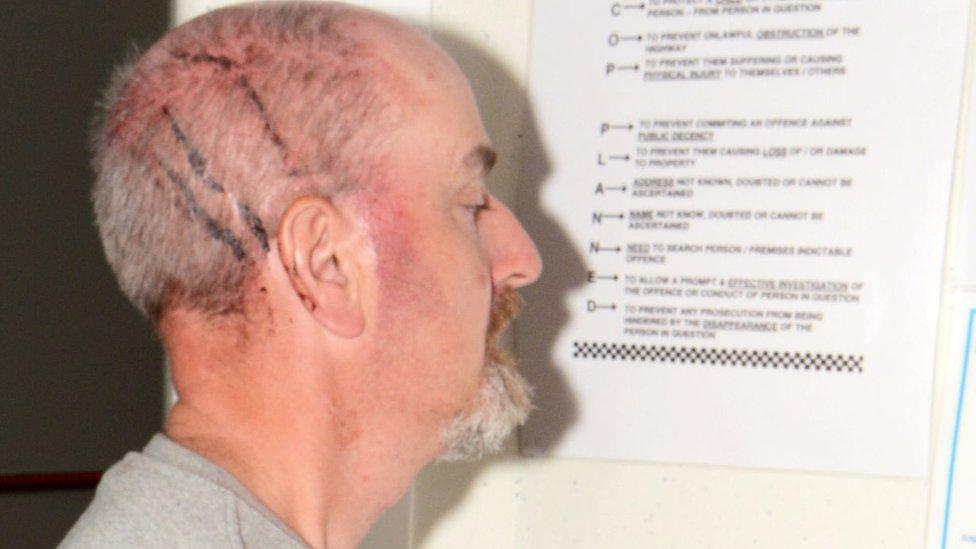
Thomas Mair after he had murdered Jo Cox. The photo shows the injuries he sustained in the attack made by his own knife.
Through his own words, the very few he has uttered, Thomas Mair has made clear his murder of the MP Jo Cox was politically motivated, the very definition of an act of terrorism, external, write Dominic Casciani and Daniel De Simone.
Richard Whittam QC, prosecuting, told the Old Bailey jury that on 16 June the two extremes of humanity - Mair's hatred and the goodness of Mrs Cox and those who rushed, in vain, to help her - had come face to face.
Mair was born in Scotland in 1963 to parents who had married after he was conceived.
When he was still a small boy, the family moved to a semi-detached house in Birstall, West Yorkshire, where he still lived at the time of the murder.
He remained at the property, living first with his maternal grandparents, then, after his grandmother died, in 1996, alone.
He attended a local college as a mature student and spent time as a volunteer gardener after attending a centre for adults with mental health problems.
In a local newspaper interview on the topic, Mair said: "Many people who suffer from mental illness are socially isolated and disconnected from society, feelings of worthlessness are also common, mainly caused by long-term unemployment.
"Getting out of the house and meeting new people is a good thing, but more important in my view is doing physically demanding and useful labour."
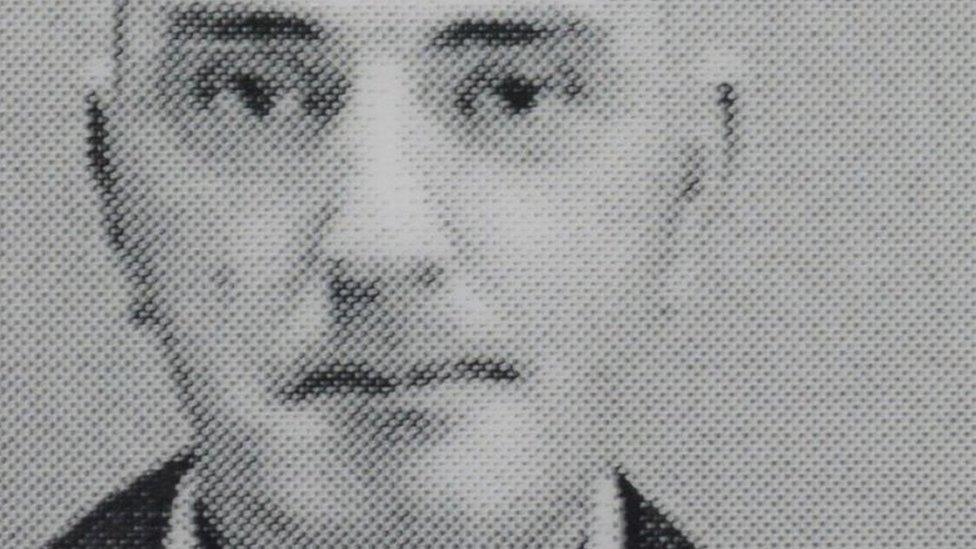
Thomas Mair's library card
In the days before Mrs Cox's murder, Mair would visit his local library and use the internet to work out how he was going to kill her.
His chosen weapons were a knife and a small rifle usually used for pest control on farms.
Mair did not have the permission required to possess the rifle. The police say it was stolen in Keighley last year. They are still investigating whether Mair was involved or got it from someone else - and who modified it to make it more likely to kill a human.
But the jury was told he had watched a number of American videos showing men firing a similar sawn-off rifle.
He also looked at web pages about members of the Ku Klux Klan and people murdered in the US because of their civil rights work.
He worked his way through a list of political assassinations, including that of John F Kennedy and the 1990 IRA killing of Conservative MP Ian Gow.
He read up on matricide, the crime of killing one's mother, political prisoners, "lying in state", coffins and arrangements for a pauper's funeral.
And then he asked one of the members of staff about Mrs Cox's constituency surgeries at the library.
No need to make an appointment, just turn up, the librarian said, pointing Mair towards a poster displaying the details.
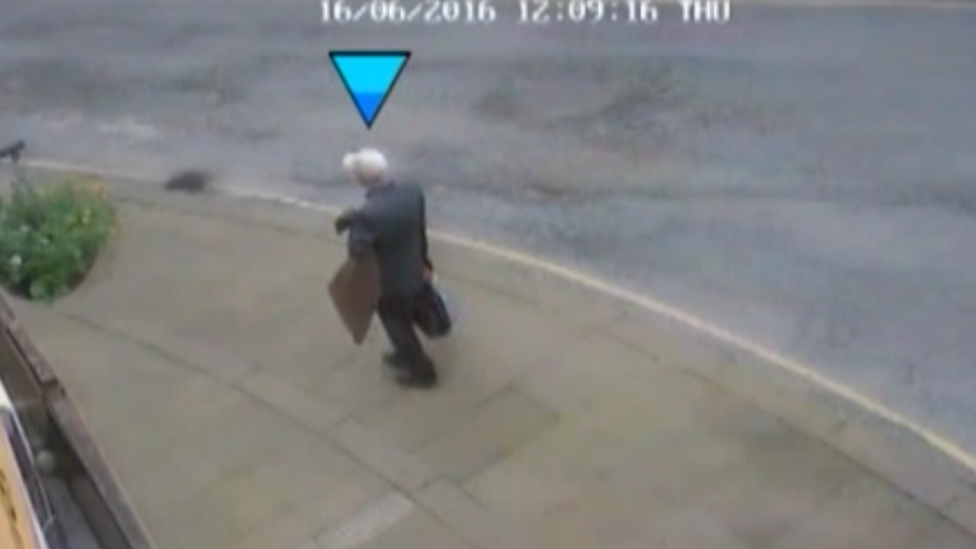
Watching and waiting: Thomas Mair in the moments before the attack
On 16 June, Mair left home wearing a white baseball cap and carrying a grey canvas shopping bag.
On the street CCTV cameras, he looked like any another middle-aged shopper.
He stood around near the library on Market Street, eating a Cadbury's chocolate flake.
He was carrying a leaflet from the campaign to remain in the EU.
The referendum was seven days away.
Mrs Cox had been doing constituency work all day.
Shortly before 13:00, she and two members of her constituency team drove up to the library to begin setting up for an hour of meeting the public to help solve their problems.
As the MP emerged from the car, Mair fired his gun.
He shouted: "Britain first, this is for Britain.
"Britain will always come first.
"We are British independence.
"Make Britain independent."
Mrs Cox, thrown to the ground by the force of the attack, shouted to her assistants: "Get away, you two.
"Let him hurt me.
"Don't let him hurt you."
Her words drew Mair back in, and he attacked her with the knife.
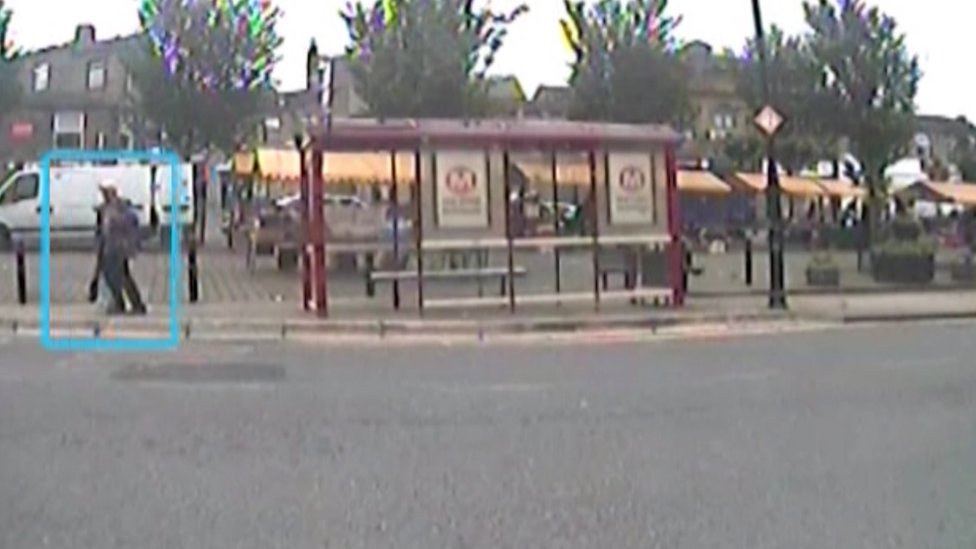
Waiting by the bus stop
Bystander Bernard Carter Kenny, 78, ran to intervene.
Mair stabbed him, and the pensioner collapsed in the entrance of a sandwich shop.
Mair shot again at Mrs Cox.
Rashid Hussain, a taxi driver, screamed at Mair to leave her alone.
Mair threatened him and again shouted: "Britain first."
David Honeybell, who had been waiting at the library to meet Mrs Cox, saw Mair stab and shoot the MP.
"I went back in the library and said, 'Call the police,'" he tells BBC News.
"He just turned away, walked down the street as if nothing had happened, just as if he had be going round for an afternoon stroll."
Outside the library, paramedics and a doctor desperately tried to save Mrs Cox.
They performed an emergency thoracotomy - an extreme procedure to open the chest as part of resuscitation.
Meanwhile, Mair strolled on.
Another witness followed from a safe distance and directed the police to the killer.
Officers rugby-tackled him, and, calmly, he confirmed he had weapons in the bag.
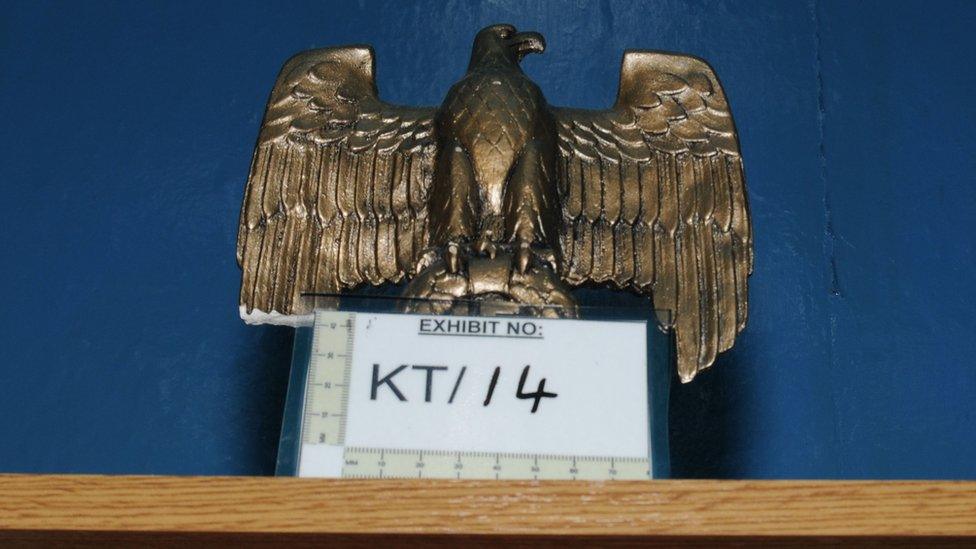
Nazi eagle: Pride of place upon Mair's bookshelf
When detectives searched Mair's home, they found it as methodically organised as his attack - but also a library of extreme nationalist and racist material.
An ornamental Nazi eagle had pride of place on top of a bookshelf packed with far-right literature.
In drawers, there were books about the SS and pamphlets about white supremacy.
He had a vast collection of literature from the National Alliance, an American neo-Nazi group.
All of this came as a shock to his next-door neighbour Katie Green.
She remembers a man who had some mental health problems and some unusual habits.
"If you ever saw him in the garden, he always had the gloves on," she tells BBC News.
"He shut the garden gate with his gloves on or a piece of tissue if he did not have them.
If we turned the car round at the garages round the back and his door was open, he was always cleaning his kitchen - a precise kind of fellow."
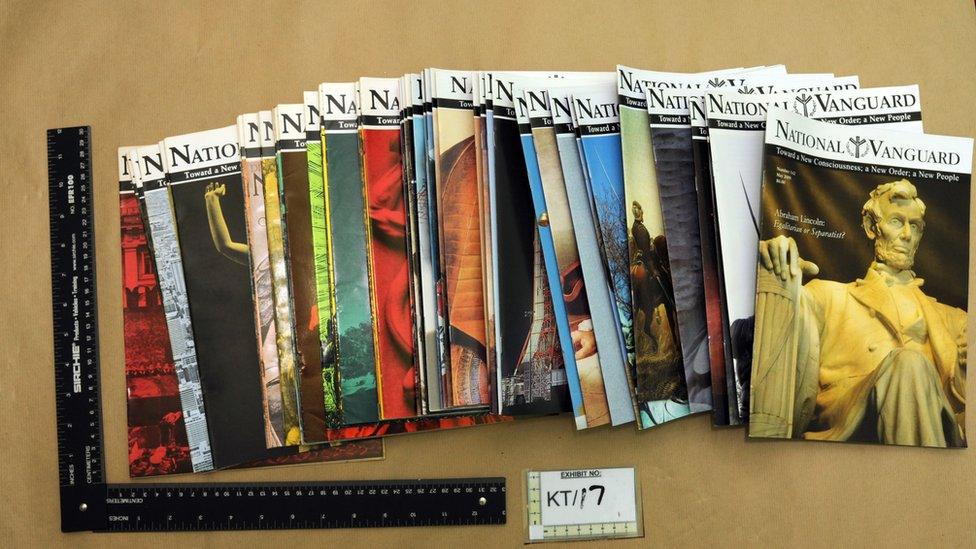
National Vanguard: Magazines found in Mair's home
Stephen Lees has known Mair for years, through his brother.
"He never showed any political interest at all, never mentioned it, not even to his brother," he tells BBC News.
"It is shocking to think someone has got that much hatred, because he seemed a very normal lad."
The precise state of Mair's mind at the time of the attack remains unclear.
He has largely refused to engage with the court process, including attempts to assess whether or not he is capable of standing trial on mental health grounds, or even to enter a plea of not guilty.
He said little of use to defence lawyers appointed to ensure he received a fair trial.
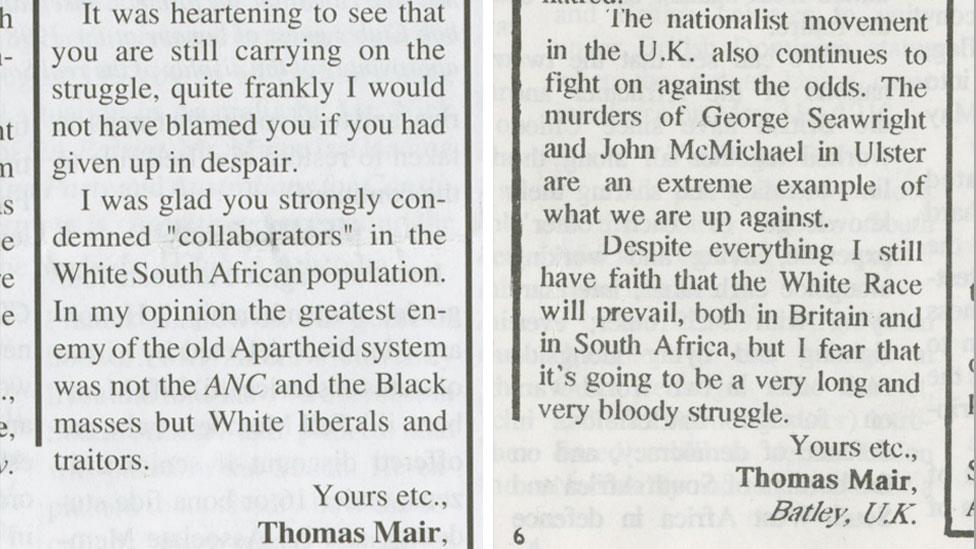
Thomas Mair's letters to a racist South African magazine
At his first appearance, he said his name was "Death to traitors, freedom for Britain".
As far back as 1984, Mair was buying neo-Nazi publications, and he had letters published in a racist South African magazine.
The Southern Poverty Law Centre, an American anti-fascist organisation, has published records showing Mair ordered books on improvised munitions and explosives from the neo-Nazi National Alliance's publishing imprint. Those orders were placed days after David Copeland had attempted to spark a "race war" in a series of bombings across London.
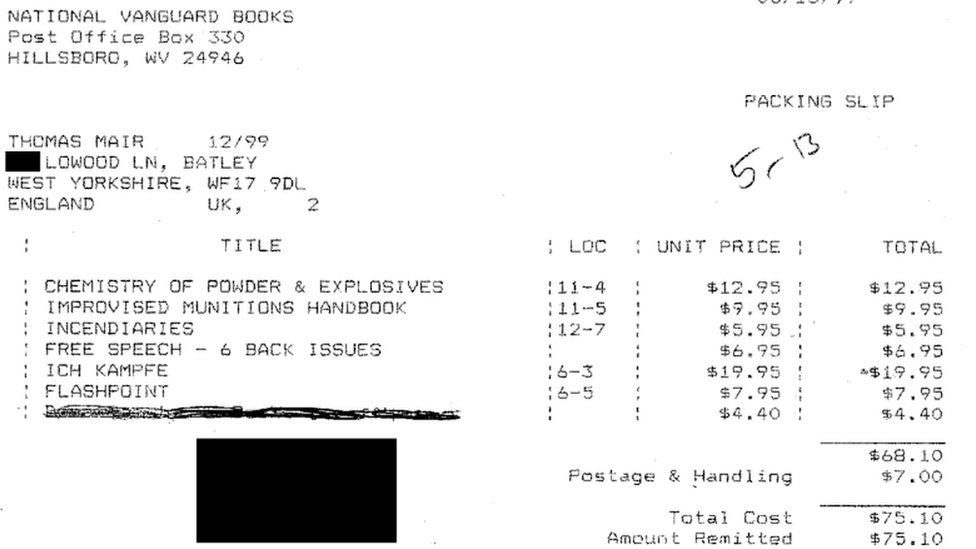
Book orders from 1999 - long before such extremist material was circulating on the internet
But the mystery of Mair is he appears to have simply got on with forming and reinforcing his views with no contact to any of the known extremist organisations in the UK.
There is no evidence of him having been identified at rallies or marches down the years.
He was not prominent on social media.
He was immersed in his books.
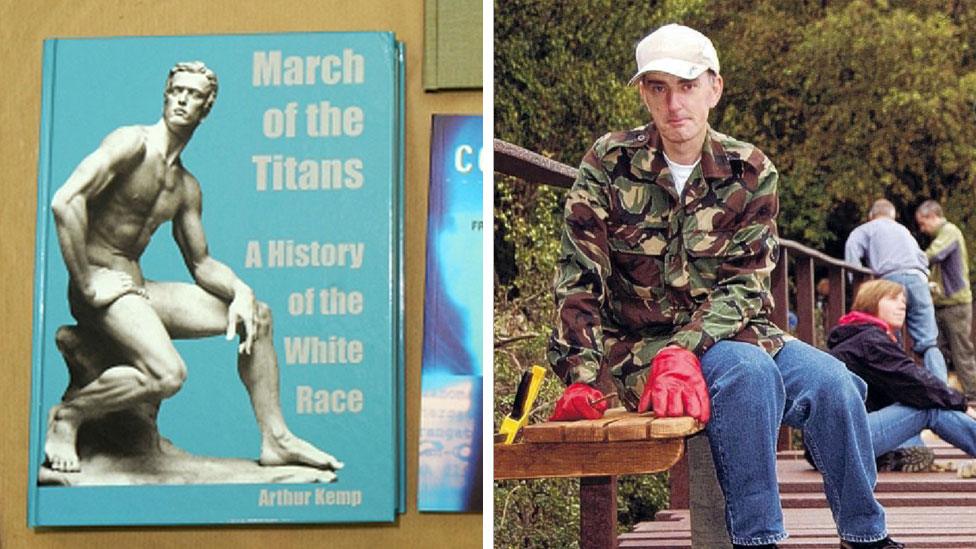
An idealised vision of the "white race" found in Thomas Mair's home - and Thomas Mair
Amid all the Nazi literature in Mair's home, was a book called SS Race Theory and Mate Selection Guidelines.
"Your wife should be at least as racially worthy as yourself," it says.
"In your children, you live on."
Mair will go to prison childless.
But the memory of Mrs Cox lives on, not least, through her children, whom she and her husband, Brendan, were raising to be model citizens: caring for each other and caring about a society built on goodness, not hate.